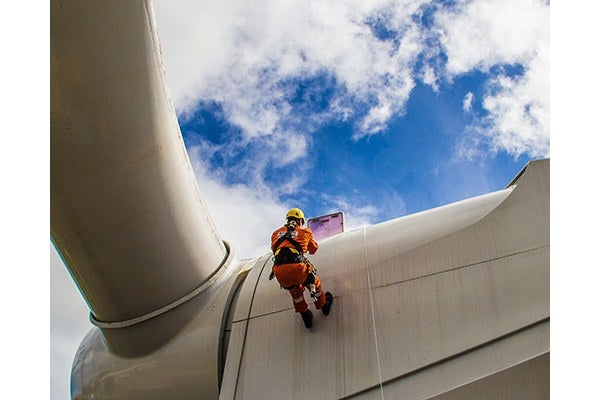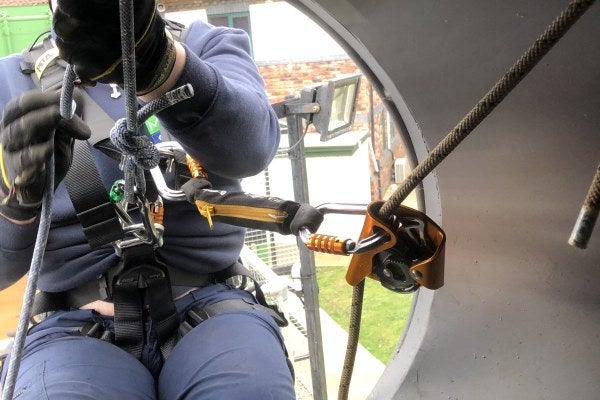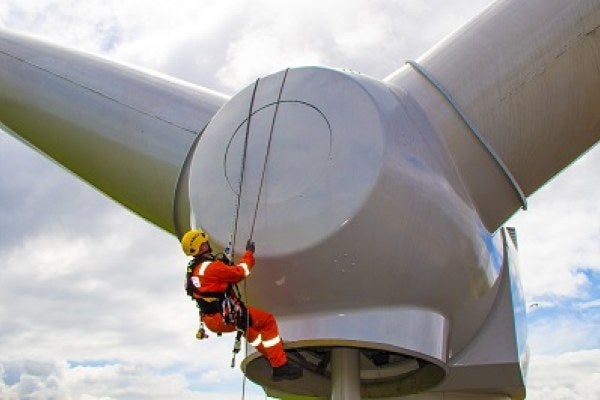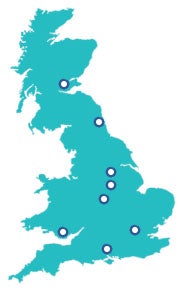GWO WIND TURBINES ONSHORE BASIC SAFETY TRAINING (BST)
Breaks for refreshments are included in this overall total
This Basic Safety Training course is GWO approved (Global Wind Organisation) – and is designed for those who work or wish to work in the wind turbine industry. Before delegates are allowed to work in a wind turbine, they have to complete the GWO Basic Safety Training first.
A complete package of training that incorporates the GWO Working at Height with Manual Handling, GWO First Aid and GWO Fire Awareness courses, offered at a discounted rate. Designed to provide candidates with the skills they need to enable them to work in a safe manner in the wind turbine industry. Accommodates people working onshore. This course is highly practical and includes training on purpose built working at height facilities.
Those who attend this course must also register to be part of the Global Wind Industry Training Records Database (WINDA) and will be required to bring along their registration number to start this course.
Due to the nature of the training course and the emphasis placed on communication, there is only a provision for the assessments to be undertaken in English. Therefore, candidates for this type of training must be able to understand and speak the English language.
On this 3.5 day course, delegates will learn and develop practical skills which will enable them to work safely on onshore wind turbines.
Topics covered on this course include:
Working at Height with Manual Handling – learn how to work safely at heights and perform rescue from height in a remote wind turbine environment. Delegates will also learn to safely lift under 15kg individually and under 30kg in a team, to encourage positive Manual Handling and ergonomic behaviour in a wind turbine industry/environment.
First Aid – gain the skills and knowledge required to administer safe and effective First Aid in the wind turbine industry/ WTG environment, learning how to deal with choking, shock, seizures, bleeding and how to handle a casualty, both individually and as part of a team.
Fire Awareness – learn basic firefighting knowledge and skills to prevent fires, conduct initial and appropriate judgement when evaluating a fire, manage evacuation of personnel and know how to efficiently extinguish an initial fire by using basic hand held firefighting equipment.
To view the full course timetable click here.
This course is taught by trained, experienced instructors who have all complete regulated assessor awards.
All of our instructors have the skills and first-hand experience to bring our lessons to life.
On successful completion of the course, candidates will be accredited for:
We then upload this to the WINDA portal: Global Wind Industry Training Records Database and delegates can access this using their WINDA registration number.
2 years. We also offer GWO Refresher Courses if you require re-certification.
No. The course is accredited by GWO, but no funding is available.
1 training to 12 candidates
- Theory training
1 trainer to 6 candidates
How can I pay for this course?
If you book this course online, you can pay for the course by debit or credit card.
If you wish to pay via an invoice, please enquire about the course and our team will contact you to complete the booking.
What time does the course start and finish?
Courses start at 8.30 am and finishes at about 4.30 pm on days one and two and finishes about 12.30 pm on day three.
Do I need to bring PPE?
Yes – all candidates are required to bring the following for practical exercises: • Hard hat • Overalls • Safety footwear • Gloves
Are there any other pre-requisites?
Yes. before the start of the course candidates must register for WINDA: Global Wind Industry Training Records Database and bring along their registration number. Registering with WINDA is quick, easy and free of charge. Delegates should also be fit enough to participate in practical exercises and assessments.
What is included in the price?
Course materials, refreshments and a light lunch are provided.
How long does it take for certificates to arrive?
Certificates are not issued, but on successful completion of the course, candidates will be accredited and details are uploaded to the WINDA portal: Global Wind Industry Training Records Database. Delegates can access this using their WINDA registration number.
When will I receive my course instructions?
Joining instructions are sent by email – which are usually received on the same day but always within 48 hours of booking.
Can I change my booking?
Yes - subject to our terms and conditions.
Is there parking?
Yes, free parking is available at all our UK training centres for course candidates.
MRS have always provided us with high class training with knowledgeable instructors. Our technicians have often said the courses are among the best they’ve been on.
I undertook the GWO Basic Safety Training. Both the trainer (Aiden) and facilities were excellent. Aiden was knowledgeable on the subjects and the site had all equipment and amenities required.
Thanks to all the team at Knottingley.










